选修7第四单元语法
2020年高考英语复习选修7Unit 4Sharing
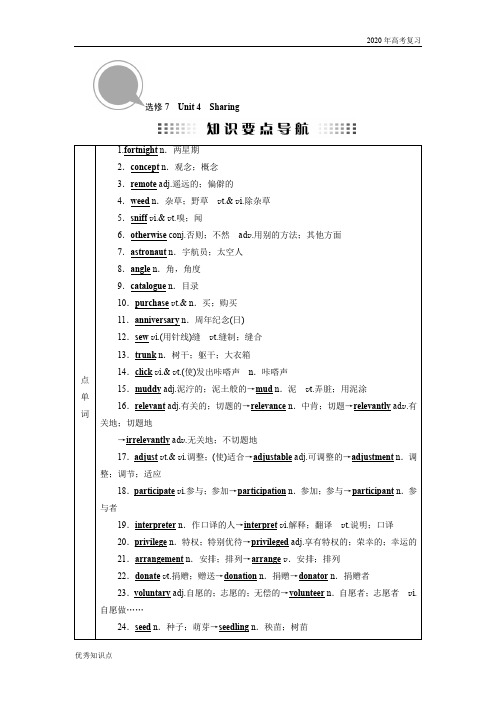
选修7Unit 4Sharing1.fortnight n.两星期Sometimes I wonder how relevant chemistry is to these students, most of whom will be going back to their villages after Year 8 anyway.(教材P29)有时候,我真想知道,化学与这些学生究竟有多大的关联。
他们中的大多数上完八年级以后就要回到他们的村庄去了。
be relevant to(=have sth to do with)与……有关be irrelevant to 与……不相关totally/completely/largely irrelevant 完全/绝对/基本上无关的①I don't think his remarks are relevant to our discussion.我认为他的话与我们的讨论无关。
②The documents are largely irrelevant (relevant) to the present investigation. They are useless.这些文件与目前进行的调查基本上不相干。
没什么用处。
2adjust v t .& v i .调整;(使)适合 The hut was dark inside so it took time for our eyes to adjust.(教材P 30)小屋内很黑,因此我们的眼睛过了好一阵才适应过来。
(1)⎩⎪⎨⎪⎧ adjust to sth/doing sth 适应于某事/做某事adjust/adapt oneself to 使自己适应于…… (2)⎩⎪⎨⎪⎧adjustment n .调整;调节;适应make an adjustment 作出调整 (3)adjustable adj .可调整的;可调节的①Mr Brown has some difficulty in adjusting to the new climate.布朗先生不大容易适应新的气候。
人教选修七 Unit4 Sharing词汇语言点
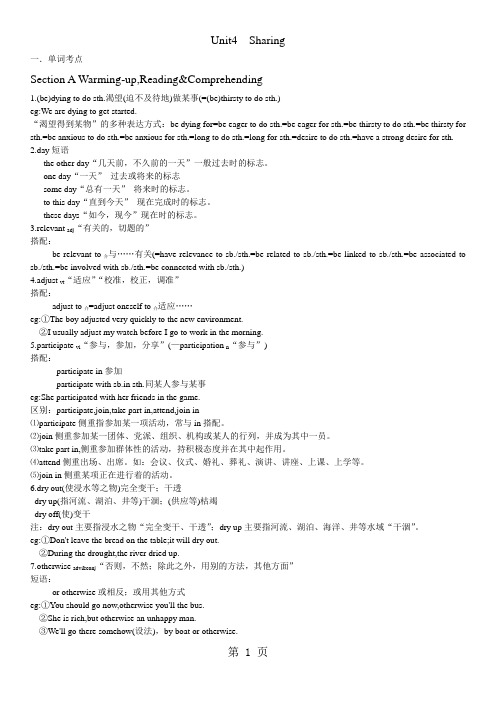
Unit4 Sharing一.单词考点Section A Warming-up,Reading&Comprehending1.(be)dying to do sth.渴望(迫不及待地)做某事(=(be)thirsty to do sth.)eg:We are dying to get started.“渴望得到某物”的多种表达方式:be dying for=be eager to do sth.=be eager for sth.=be thirsty to do sth.=be thirsty for sth.=be anxious to do sth.=be anxious for sth.=long to do sth.=long for sth.=desire to do sth.=have a strong desire for sth. 2.day短语the other day“几天前,不久前的一天”一般过去时的标志。
one day“一天”过去或将来的标志some day“总有一天”将来时的标志。
to this day“直到今天”现在完成时的标志。
these days“如今,现今”现在时的标志。
3.relevant adj“有关的,切题的”搭配:be relevant to介与……有关(=have relevance to sb./sth.=be related to sb./sth.=be linked to sb./sth.=be associated to sb./sth.=be involved with sb./sth.=be connected with sb./sth.)4.adjust vt“适应”“校准,校正,调准”搭配:adjust to介=adjust oneself to介适应……eg:①The boy adjusted very quickly to the new environment.②I usually adjust my watch before I go to work in the morning.5.participate vi“参与,参加,分享”(—participation n“参与”)搭配:participate in参加participate with sb.in sth.同某人参与某事eg:She participated with her friends in the game.区别:participate,join,take part in,attend,join in⑴participate侧重指参加某一项活动,常与in搭配。
译林版高中英语选修7学案 Unit4 Publictransport SectionⅠ Word版含解析
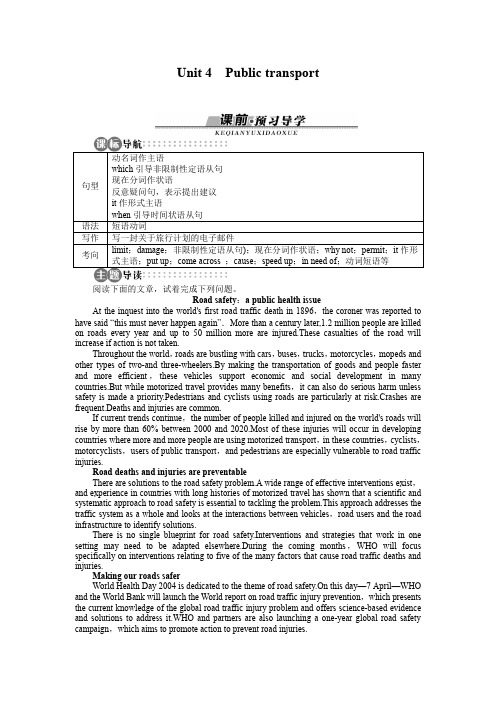
Unit 4 Public transport句型 动名词作主语which 引导非限制性定语从句现在分词作状语反意疑问句,表示提出建议it 作形式主语when 引导时间状语从句语法 短语动词写作 写一封关于旅行计划的电子邮件考向limit ;damage ;非限制性定语从句);现在分词作状语;why not ;permit ;it 作形式主语;put up ;come across ;cause ;speed up ;in need of ;动词短语等 阅读下面的文章,试着完成下列问题。
Road safety :a public health issueAt the inquest into the world's first road traffic death in 1896,the coroner was reported to have said “this must never happen again”.More than a century later,1.2 million people are killed on roads every year and up to 50 million more are injured.These casualties of the road will increase if action is not taken.Throughout the world ,roads are bustling with cars ,buses ,trucks ,motorcycles ,mopeds and other types of two-and three-wheelers.By making the transportation of goods and people faster and more efficient ,these vehicles support economic and social development in many countries.But while motorized travel provides many benefits ,it can also do serious harm unless safety is made a priority.Pedestrians and cyclists using roads are particularly at risk.Crashes are frequent.Deaths and injuries are common.If current trends continue ,the number of people killed and injured on the world's roads will rise by more than 60% between 2000 and 2020.Most of these injuries will occur in developing countries where more and more people are using motorized transport ,in these countries ,cyclists ,motorcyclists ,users of public transport ,and pedestrians are especially vulnerable to road traffic injuries.Road deaths and injuries are preventableThere are solutions to the road safety problem.A wide range of effective interventions exist ,and experience in countries with long histories of motorized travel has shown that a scientific and systematic approach to road safety is essential to tackling the problem.This approach addresses the traffic system as a whole and looks at the interactions between vehicles ,road users and the road infrastructure to identify solutions.There is no single blueprint for road safety.Interventions and strategies that work in one setting may need to be adapted elsewhere.During the coming months ,WHO will focus specifically on interventions relating to five of the many factors that cause road traffic deaths and injuries.Making our roads saferWorld Health Day 2004 is dedicated to the theme of road safety.On this day —7 April —WHO and the World Bank will launch the World report on road traffic injury prevention ,which presents the current knowledge of the global road traffic injury problem and offers science-based evidence and solutions to address it.WHO and partners are also launching a one-year global road safety campaign ,which aims to promote action to prevent road injuries.The loss and suffering associated with road traffic deaths and injuries are preventable.With firm political will and an integrated approach that addresses vehicles,the people who use roads,and the road infrastructure,roads can be made safer.Questions:1.How many people are killed on roads every year now according to the text?2.How can people prevent road traffic deaths and injuries?Keys:1.1.2 million people (are killed on roads every year).2.With firm political will and an integrated approach that addresses vehicles,the people who use roads,and the road infrastructure,roads can be made safer.诱思探究Do you know any effective approach that can make our roads safer?一、词汇拓展1.__________adv.遗憾地,不幸地→__________ adv.幸运地→__________ adj.幸运的2.__________ adj.难以置信的→__________adj.可信的→ __________ v.相信,认为→__________ n.相信,信赖,信念3.________ v.承担,从事→________ n.承担者,承办人4.__________n.所有权,产权→__________ n.主人→__________ v.拥有,adj.自己的5.__________ v.扩大,扩展→__________ adj.大的,多数的6.__________ n.周年纪念日→__________ adj.每年的,一年一次的7.__________ n.增加,增长→__________ v.种植,生长8.__________ n.询问,咨询→__________ v.询问,调查9.__________ n.少量的人或物;一把的量→__________n.手,vt.传递10.__________v.分割,分开→__________ (过去分词)11.__________n.接待员→__________ n.接待,接收→__________ v.接待;收到12.__________ n.预定,预约→__________ v.预约,储备,保留13.__________n.离开,出发→__________ v.离开,出发14.__________ adj.好斗的,挑衅的→__________v.侵犯,挑衅15.________ adj.喝醉的,n.醉汉→________ v.喝酒,喝二、短语互译1.set a limit/limits on ____________2.under the authority of ____________3.add up to ____________4.by means of ____________5.be experienced in ____________6.a handful of ____________7.by hand ____________8.put off ____________9.put up with ____________10.come up ____________11.come across ____________12.for pleasure ____________13.without delay ____________14.on the increase ____________15.at full speed ____________16.in favour of ____________17.in need(of) ____________三、重点句型1.However,most trains to London only went to the outer city limits,because __________ __________ __________ __________ __________ __________ would have damaged many oldbuildings.然而,大部分通往伦敦的火车只到外伦敦的边界,因为在市区修建铁路会损坏许多古建筑。
人教版选修7Unit4Sharing重点短语句型及语法

人教版选修7Unit4Sharing重点短语句型及语法Book7 Unit 4必背句型1:1.It takes me only a few minutes to walk to school down a muddy track. (It takes sb. sth. to do…)相似句:The hut was dark inside so it took time for our eyes to adjust. 眼睛需要时间来调整适应。
2.The other day I was showing the boys the weekly chemistry experiment when, before I knew it, themixture was bubbling over everywhere!(was/were doing…when…正在做…突然…;before还没来得及) 仿写:They were shopping when the hotel opposite the street fell down.他们正逛街突然对面酒店倒塌了。
The ruins fell onto them before they could fled from the spot.他们还没来得及跑出现场,废墟就砸他们身上了。
3.There was a newly made platform (for Jenny and me)to sleep on.新做了一个平台,是让我和珍妮睡觉用的。
(to sleep on作定语,与所修饰的platform有动宾关系,不能省略on, 不定式前有for sb, 可知是主动的)必背短语1:1.work as 充当;担任;担任…的工作→近义短语:serve as/ act as2.take photos of / take a photo of 给…拍照3.hear from 收到…的来信hear about 听到;得知;了解4.be dying to do渴望做;极想做→be eager/desperate/thirsty/greedy to do→long/desire to do →have a strong desire to dobe dying/eager/desperate/thirsty/greedy for sth. →long for→have a strong for 极想/渴望得到…5.be made of/from由…制成be made up of由…组成be made in在…制造6.up to 多达;直到;胜任;由…负责7.adapt to 适应→adjust to →make an adjustment to (作出调整以)适应adapt oneself to (使自己)适应= adjust oneself to (调整自己以)适应8.for sure 确定的(地);确切的(地)9.the other day 不久前的一天(典型的一般过去时的时间状语)/doc/692682126.html,e across (偶然)遇见;(偶然)碰到→run into11.be relevant to 与…相关;与…密切相关12.make a difference (to…)对…有影响;有所作为13.shake hands with 和…握手14.get through 通过;度过;完成;接通(电话等)15.participate in→take part in /join in16.dry out (指浸水等之物)变干;干透(become empty of water; to become completely dry)dry up (指河流、井、食物等)干涸(to become completely dry; to come to an end)dry off (使) 变干;使干透,弄干(to become dry on the surface) 课文词块翻译1:1.have no concept of doing experiments 没有做实验的概念2.to be honest 老实说;说实话3.build a fire 生火4.covered the vegetables with banana leaves 用香蕉叶盖住蔬菜5.with grass sticking out of the roof 茅草伸出屋顶必背句型2:1.The gift you give is not something your loved one keeps but a voluntary contribution towards thelives of people who really need it.(not…but…并列连词,连接并列的结构,连接并列主语时,谓语动词与就近的主语保持一致;此句中含有三个定语从句)仿写:Such is life. The one who I loved didn’t love me while I didn’t love the one who loved me.人生如此奇妙。
2019-2020学年外研版英语选修7新素养同步 Section Ⅳ Grammar
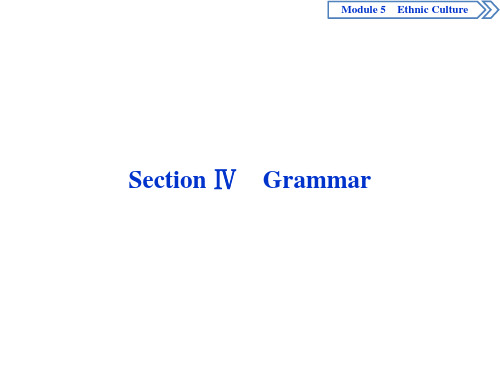
3.动词+副词+介词
这类动词短语相当于一个及物动词。宾语总是位于介词之
后。
do away with
废弃;废除
get on/along with
与……相处
catch up with
赶上;跟上
add up to
总计达
break away from
从……脱离;打破……
fit in with
适应/符合……
栏目 导引
随便吃 专心于 穿着 忙于 专心;致力于
栏目 导引
(3)动词+介词+名词 keep...in mind put...into effect take...into consideration come into being come into effect burst into tears
Module 5 Ethnic Culture
栏目 导引
Module 5 Ethnic Culture
在“动词+副词”的短语中,若宾语是名词,既可置于副 词后面,也可置于动词和副词之间。若宾语是代词,只能置于 动词和副词之间。
栏目 导引
2.动词+介词
Module 5 Ethnic Culture
动词与介词构成的短语在意义上相当于一个及物动词,宾
Module 5 Ethnic Culture
Section Ⅳ Grammar
Module 5 Ethnic Culture
过去分词(短语)作状语和动词短语
1.(教材 P58) _________ (see) from above, the old town is a maze of canals, little bridges and tiny cobbled streets that tourists get lost in. 答案:Seen
高中英语选修7Unit 4重点梳理和练习

话题词汇1.donation n.捐献2.volunteer n.志愿者3.participate v.参加4.improve v.改善5.launch v.发起6.distribution n.分配;分发7.in need需要8.Project Hope希望工程9.share sth.with sb.与某人分享某物10.a contribution towards...对……的捐助话题佳作假如你是济南第一中学(Jinan No.1 High School)的李华,想申请一个扶贫项目,帮助贫困地区的儿童。
请根据以下启事,写一封英文申请信。
启事国际儿童基金会将帮助中学生开展扶贫项目,以帮助贫困地区的儿童。
申请成功者将获得项目经费5 000元。
有意者请来信告知:1.你个人的基本情况;2.你对申请项目的基本设想;3.项目经费的使用计划。
佳作欣赏Dear Chairman,I’m writing to you to apply for the project,which will offer me an opportunity to help more children.First,I’ll introduce myself to you.I’m Li Hua,a Senior 3 student of good character and fine scholarship at Jinan No.1 High School.I’m always ready to help others in my daily life.If I succeed in applying for it,I’ll keep in touch with the poor children frequently by writing letters,emails or meeting face to face.In the meanwhile,I’ll help them acquire a correct outlook on life,helping them exploit knowledge to change their future.Taking the project fund into account,I’ll divide it into two parts.One is used for their tuition; the other is for their daily life.Such is my plan.I’m looking forward to your reply at your earliest convenience.Yours sincerely,Li Hua 名师点睛本文包含了写作要求的所有要点,所增加的细节恰当可读;条理清楚;文章运用了定语从句、条件状语从句、非谓语动词作状语以及倒装句等高级复杂句式。
人教版高中英语选修7Unit4知识点详解

adjustment n.调整;修正
adjustable adj.可调节的;可调整的注意:该词作不及物动词时,意为“适应于”,后常跟介词to。
高手过招
(1)单项填空
①You can’t see things clearly through a telescope unless it iscorrectly to your sight.
A.adjusted B.examined C.checked D. tested
②You canthis deskthe height of any child.
A. adjust; to B. make; to C. suit; to D. remain; for
(2)翻译句子(原创)
①他很快就适应了这种生活方式,从此幸福地生活着。
participate in正式用语,表示参加,参与。强调与他人共同参加某一活动,暗示以一种积极的态度参加。
attend正式用语,一般用于指参加会议,出席典礼或招待会等,也可以指上学,听课,听演讲或讲座等。
join常用词,作及物动词;通常指参加某组织或团体,并成为其中的一员,其宾语往往是the army/party/team/club等。
高手过招
(1)单项填空
The teacher is easy-going, and she oftenin the pupils’games.
He adjusted himself very quickly to the heat of the country.他使自己很快适应了这个国家炎热的气候。
These desks and chairs can be adjusted to the height of any child.这些桌子和凳子能被调整到适合任何孩子的高度。
高二英语选修7学案:语法解读Unit4 Sharing含解析
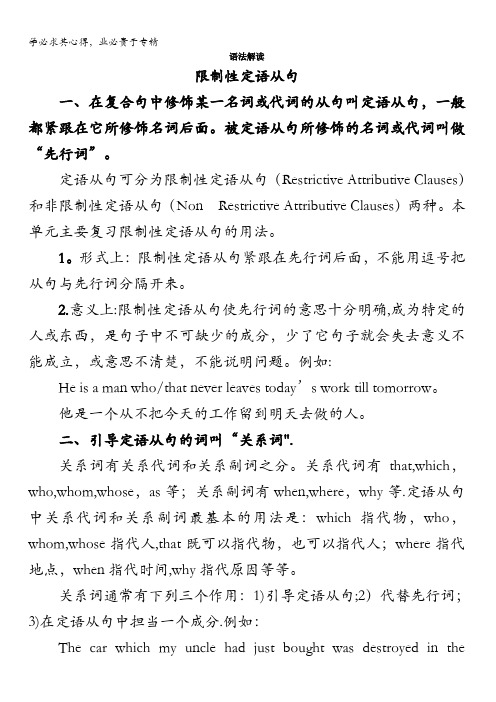
语法解读限制性定语从句一、在复合句中修饰某一名词或代词的从句叫定语从句,一般都紧跟在它所修饰名词后面。
被定语从句所修饰的名词或代词叫做“先行词”。
定语从句可分为限制性定语从句(Restrictive Attributive Clauses)和非限制性定语从句(Non Restrictive Attributive Clauses)两种。
本单元主要复习限制性定语从句的用法。
1。
形式上:限制性定语从句紧跟在先行词后面,不能用逗号把从句与先行词分隔开来。
2.意义上:限制性定语从句使先行词的意思十分明确,成为特定的人或东西,是句子中不可缺少的成分,少了它句子就会失去意义不能成立,或意思不清楚,不能说明问题。
例如:He is a man who/that never leaves today’s work till tomorrow。
他是一个从不把今天的工作留到明天去做的人。
二、引导定语从句的词叫“关系词".关系词有关系代词和关系副词之分。
关系代词有that,which,who,whom,whose,as等;关系副词有when,where,why等.定语从句中关系代词和关系副词最基本的用法是:which指代物,who,whom,whose指代人,that既可以指代物,也可以指代人;where指代地点,when指代时间,why指代原因等等。
关系词通常有下列三个作用:1)引导定语从句;2)代替先行词;3)在定语从句中担当一个成分.例如:The car which my uncle had just bought was destroyed in theearthquake 。
句中,which my uncle had just bought是定语从句,修饰先行词the car;which是引导定语从句的关系词,代替先行词the car,在定语从句中作主语。
关系词功能在从句中的成分例句that指人/物作主语、宾语The school made threerules that would playimportant role in ourschool life.which指物作主语、宾语He asked two days off which cost him 100 yuan。
人教版高中英语选修七讲义Unit 4 Section Ⅲ Grammar——限制性定语从句
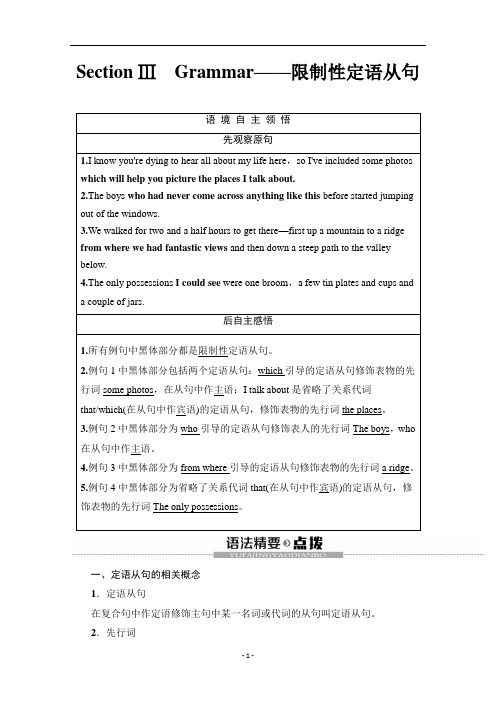
Section ⅢGrammar——限制性定语从句语境自主领悟先观察原句1.I know you're dying to hear all about my life here,so I've included some photos which will help you picture the places I talk about.2.The boys who had never come across anything like this before started jumping out of the windows.3.We walked for two and a half hours to get there—first up a mountain to a ridge from where we had fantastic views and then down a steep path to the valley below.4.The only possessions I could see were one broom,a few tin plates and cups anda couple of jars.后自主感悟1.所有例句中黑体部分都是限制性定语从句。
2.例句1中黑体部分包括两个定语从句:which引导的定语从句修饰表物的先行词some photos,在从句中作主语;I talk about是省略了关系代词that/which(在从句中作宾语)的定语从句,修饰表物的先行词the places。
3.例句2中黑体部分为who引导的定语从句修饰表人的先行词The boys,who 在从句中作主语。
4.例句3中黑体部分为from where引导的定语从句修饰表物的先行词a ridge。
5.例句4中黑体部分为省略了关系代词that(在从句中作宾语)的定语从句,修饰表物的先行词The only possessions。
高考英语 Unit4《Sharing》知识与要点课件 新人教选修7

She participated with her friend in her sufferings. 她分担朋友的痛苦。 I participate in your suffering and joy.我跟你同甘共苦。 All the participants in the debate will have an opportunity to speak.所有参加辩论的人都有机会发言。 We want more participation in the decisionmaking. 我们想更多地参与决策。
These desks can be adjusted to the height of any child. 这些桌子可以按儿童的身高调整。 She soon adjusted herself to his way of life. 她很快使自己适应了他的生活方式。 She went through a period of emotional adjustment after her marriage broke up. 婚姻破裂后,她熬过了一段感情调整期。
【链接训练】 If we all save a little money every day to ________ to the Project Hope,then many dropouts can return to school again. A.gifted B.donate C.present D.give 【解析】 句意为:如果我们每天都节约一点钱,把它捐赠给希望工程,那么很多失学者就可以重返校园了。donate“捐赠”,符合题意。present sth. to sb.“赠送给某人某物”;give后可直接跟双宾语,give sb. sth.“送给某人某物”,均与题意不符。 【答案】 B
高中英语选修7(新课标)4-4 Grammar—限定性定语从句 教学课件
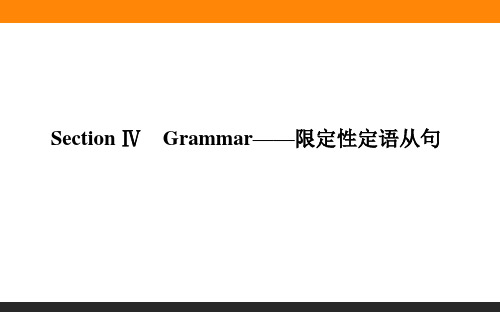
but not full sentences. 4.This smart keyboard precisely measures the cadence ( 节奏)
4.(教材 P29)We walked for two and a half hours to get there—first up a mountain to a ridge from _w__h_e_re___ we had fantastic views and then down a steep path to the valley below.
Children who are not active or whose diet is high in fat will gain weight quickly.
不爱活动或其饮食含高脂肪的孩子会很快长胖。 6.关系代词 as 在定语从句中作主语或宾语。常用句型 such...as... 像……如此的……;the same...as...像……一样的……。
The first place that they visited in London was the Big Ben. 他们在伦敦参观的第一个地方就是大本钟。 4)当先行词既有人又有物时。 They often refer to the director and his films that I like best. 他们经常提到我最喜欢的导演和他的电影。
2020学年高中英语 Unit 4 Public transpor Section Ⅳ Grammar & Writing教学案 牛津译林版选修7

Unit 4 Public transpor Section Ⅳ Grammar & Writing语法图解探究发现①This traffic problem led to the development of the underground system.②In 1884, the Metropolitan Railway Company and the Metropolitan District Railway linked up...③When London was bombed, many underground stations functioned as bomb shelters.④But you will have to fill in a form and then we will decide on the best way.⑤We could split up into groups, and come at different times.⑥I can call you back later.[我的发现](1)以上例句中黑体部分在句中作谓语;它们不是一个词单独作谓语而是由动词加一个介词或副词一起作谓语。
(2)①③④句中黑体部分的构成特点是它们都是由动词加介词构成的,相当于及物动词,可以直接带宾语。
(3)②句中黑体部分的构成特点是由动词加副词构成的,其后不接宾语;若接宾语,需要加介词,如⑤句。
(4)⑥句中黑体部分的构成特点是由动词加副词构成的,其后可以加宾语。
宾语为代词时,必须放在动词与副词之间。
一、动词短语的常见构成方式及特点1.动词+副词该类动词短语分及物的和不及物的两类。
Please turn off every light in the house.请把房子里的每一盏灯都关掉。
(及物)Harry turned up after the party when everyone had left.晚会后,人们都已离去,哈里出现了。
人教版高中英语选修七(Book 7 Unit 4)考点训练

人教版高中英语选修七(Book 7 Unit 4)Unit 4 Sharing 是一个面向全球的图书分享网站。
该网站组织的分享活动有两种参与方式:一是自由分享(wild release),即把书放在指定地点,由其他参与者自由获取;二是定向分享(controlled release),即直接传递给另一位参与者。
假设你是李华,请用英文写信申请参加。
内容应包括:●表明写信目的●选择一种分享方式●简述做出该选择的理由●希望了解更多信息Dear Sir/Madam,I'm a senior high school student from China.Learning that you are organizing this activity to share books worldwide, I am writing to apply for it for the simple reason that I love reading and I own a large number of books.You've introduced two ways to share books: wild release and controlled release. Of the two, the latter wins my favour. By the means of controlled release, I only need to deliver books to other participants. Not only are books shared but it can build up a bridge connecting readers from different parts of the world as well.If you could provide more specific information, I would be well grateful. Looking forward to your reply.Yours,Li Hua1.文章体裁:应用文——书信。
人教新课标2019-2020学年高二选修7 Unit 4 Sharing Grammar 定语从句 语法专项训练(含答案)
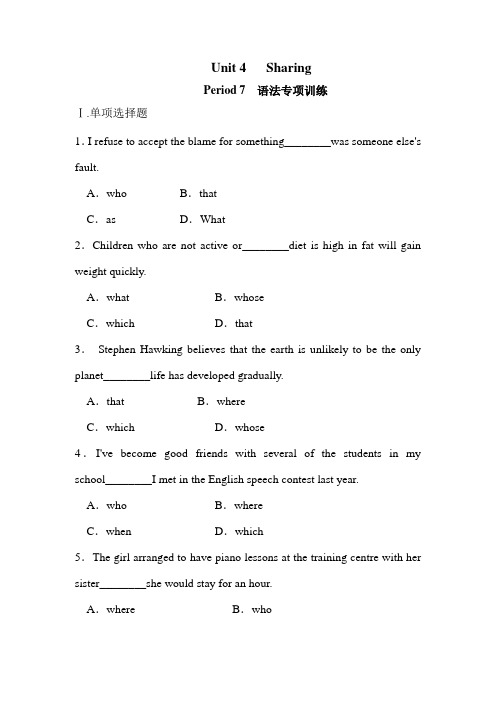
Unit 4 SharingPeriod 7 语法专项训练Ⅰ.单项选择题1.I refuse to accept the blame for something________was someone else's fault.A.who B.thatC.as D.What2.Children who are not active or________diet is high in fat will gain weight quickly.A.what B.whoseC.which D.that3.Stephen Hawking believes that the earth is unlikely to be the only planet________life has developed gradually.A.that B.whereC.which D.whose4.I've become good friends with several of the students in my school________I met in the English speech contest last year.A.who B.whereC.when D.which5.The girl arranged to have piano lessons at the training centre with her sister________she would stay for an hour.A.where B.whoC.which D.what6.That's the new machine________parts are too small to be seen. A.that B.whichC.whose D.What7.The old temple________roof was damaged in storm is now under repair.A.where B.whichC.its D.whose8.—Can you believe I had to pay 30 dollars for a haircut?—You should try the barber's________I go. It's only 15.A.as B.whichC.where D.that9.In china, the number of cities is increasing________development is recognized across the world.A.where B.whichC.whose D.that10.Wind power is an ancient source of energy________we may return in the near future.A.on which B.by whichC.to which D.from which11.The man________we sent the present to is a teacher.A.when B.whatC.why D./12.The house the windows________were damaged has been repaired. A.of that B.of whichC.who D.which13.A dictionary is a book________the meaning of the words. A.which give B.which givesC.who give D.it gives14.We then moved to Paris,________we lived for six years. A.which B.thatC.where D.who15.This is the best thing________has been used against pollution. A.when B.whichC.how D.that16.I watched all the glasses________were on the table fall off into the floor.A.that B.whichC.what D.who17.Corn was not the only food________was taken to Europe.A.it B.whichC.that D.where18.They talked about things and persons________they remembered. A.who B.whomC.which D.that19.This is the very book________I'm looking for.A.what B.whichC.that D.whom20.We haven't got much________we can offer you.A.whom B.whatC.which D.that21.Who is the woman________was praised at the meeting?A.what B.whomC./ D.that22.I know the reason________he came late.A.why B.whoC.where D.when23.The professor talked about some poets and poems______were unknown to us.A.which B.whoC.that D.whom24.This is the only invention________hasn't been put into practical use. A.which B.thatC.what D.who25.He promised to do all________he could________me out of the difficult situation.A.which; help B.that; helpedC.that; helping D.that; to help26.The second book________I want to read is Travels in China. A.which B.whatC.that D.as27.There is nothing in the world________can please him.A.which B.whatC.whom D.that28.You may borrow any book________.A.that you interestB.which you are interestedC.that interests youD.which interests you29.People________drink more than two cups of coffee a day have a greater chance of having heart disease than those________don't. A.who; / B./; whoC.who; who D./; /30.We're just trying to reach a point________both sides will sit down together and talk.A.where B.thatC.when D.which31.A fast food restaurant is the place________,just as the namesuggests, eating is performed quickly.A.which B.whereC.there D.what32.The English play________my students acted at the New Year's party was a great success.A.for which B.at whichC.in which D.on which33.There were dirty marks on her trousers________she had wiped her hands.A.where B.whichC.when D.that34.American women usually identify their best friend as someone________they can talk frequently.A.who B.asC.about which D.with whom35.What surprised me was not what he said but________he said it. A.the way B.in the way thatC.in the way D.the way whichⅡ.用恰当的关系词填空1.The book is the one _______that I like very much.2. She is a teacher _________ I like very much.3. Look at the boy and his dog _____are coming this way.4. Those pictures _________ were drawn by Tom are nice.5. You can read any book _____I have.6.The earthquake________ hit the city in 1906 was the biggest in American history.7. That was all the money ______I had.8.I have something ______must be done today.9. We don’t kn ow the number of people ________ lost their homes in 1906 earthquake.10.This is the first book ________I read.11.I got the best watch ______my brother gave me.12. The house ________ they built in 1987 stayed up in the earthquake.13.The only thing _______ I can do is to wait.14.There are many newspapers _______I have read.15. A house _________ is built on sand may fall down in a earthquake.16.Who is the woman ______shook hands with you just now.17.I don’t like that ______which he said.18. Harry is the boy ________ mother is our maths teacher.19.Tom is the one _______can swim.20.Anyone _______joins the army should be paised.21. The man ____ I saw told me to wait.22. The man to _____ I spoke was a foreigner.23. I know a boy ______ father is an acrobat. (杂技演员)24. He saw a house _____ windows were all broken.25. All the apples ____ fall are eaten by wild boars.(野猪)26. Can you think of anyone ____ could look after him?27. This is the best hotel ____ I know.28. He showed a machine _____ parts are too small to be seen.答案1--5BBBAA 6--10CDCCC 11--15DBBCD 16--20ACDCD 21--25DACBD 26--30CDCCA 31--35BCADA。
2021版高考英语增分大一轮人教版精练:选修7Unit4SharingWord版含答案
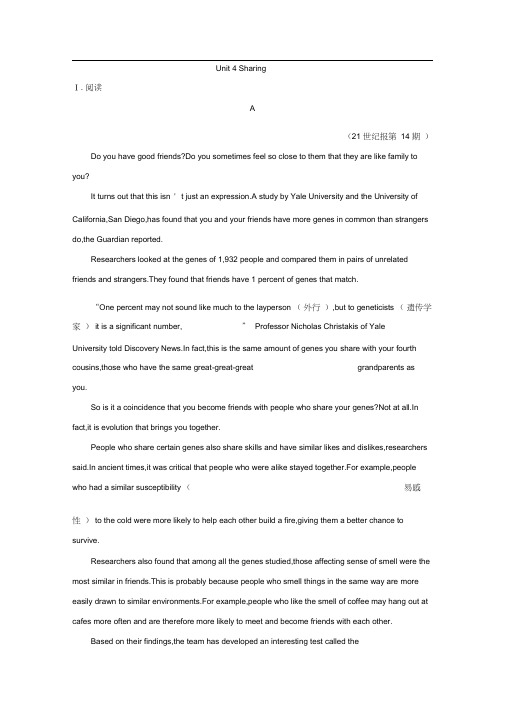
Unit 4 SharingⅠ. 阅读A(21 世纪报第14 期)Do you have good friends?Do you sometimes feel so close to them that they are like family to you?It turns out that this isn ' t just an expression.A study by Yale University and the University of California,San Diego,has found that you and your friends have more genes in common than strangers do,the Guardian reported.Researchers looked at the genes of 1,932 people and compared them in pairs of unrelated friends and strangers.They found that friends have 1 percent of genes that match.“One percent may not sound like much to the layperson (外行),but to geneticists (遗传学家) it is a significant number, ” Professor Nicholas Christakis of YaleUniversity told Discovery News.In fact,this is the same amount of genes you share with your fourth cousins,those who have the same great-great-great grandparents as you.So is it a coincidence that you become friends with people who share your genes?Not at all.In fact,it is evolution that brings you together.People who share certain genes also share skills and have similar likes and dislikes,researchers said.In ancient times,it was critical that people who were alike stayed together.For example,people who had a similar susceptibility (易感性) to the cold were more likely to help each other build a fire,giving them a better chance to survive.Researchers also found that among all the genes studied,those affecting sense of smell were the most similar in friends.This is probably because people who smell things in the same way are more easily drawn to similar environments.For example,people who like the smell of coffee may hang out at cafes more often and are therefore more likely to meet and become friends with each other.Based on their findings,the team has developed an interesting test called the“ friendship score ” .It calculates how big the chances are that two people will be friends by studying their genes.So,here is a question for you:would you like to take this test and know in advance who your friends are going to be,or would you still prefer to figure it out by yourself and let time be the judge?1. What is the author ' s main purpose in writing the article?A. To explain why friends share skills and interests.B. To report on recent findings about making friends.C. To analyze what influences the way people make friends.D. To explain an interesting test called the“ friendship score ” .2. According to the researchers of the study,people .A. form friendship by complete coincidenceB. are genetically similar to their friends,compared to strangersC. make friends with those who share nearly 10 percent of their genesD. may share more similar genes with their friends than with their fourth cousins3. With the examples of ancient people developing the ability to speak and helping each other build a fire,the author intends to .A. show how ancient people helped each other surviveB. explain that similar interests are what lead to friendshipC. show that it is evolution that brings friends togetherD. tell us why it was easier for ancient people to find friends4. According to the article,people with similar genes that affect their sense of smell .A. like to hang out at cafes more oftenB. are easily attracted to the smell of their friendsC. are more likely to be attracted to a similar environmentD. can identify people in a crowd who can become friends 语篇解读:本文是一篇研究性报告, 研究结果表明朋友之间有相似的基因。
译林版高中英语选修7优化教案 Unit 4 Section Ⅱ Welcome to the unit & Reading — Language points
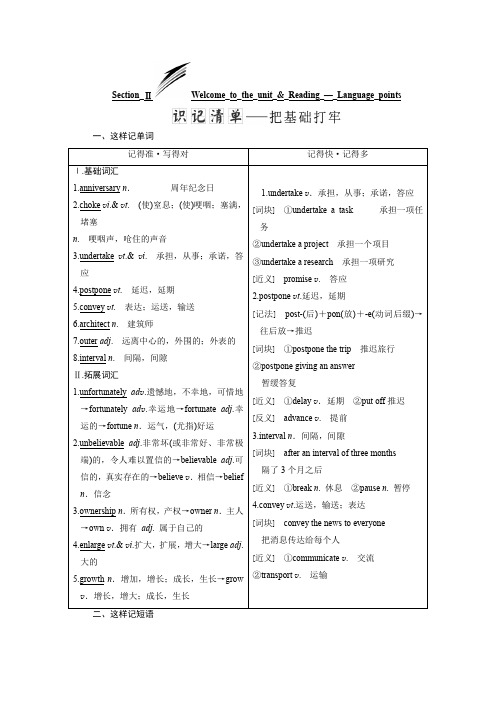
Section_ⅡWelcome_to_the_unit_&_Reading_—_Language_points一、这样记单词三、这样记句式1.(教材P49)They pick up and drop off people at different stops on the route.它们在沿途不同的站点接送乘客。
pick up开车接(某人);无意中学会;接收(节目、信号);买到某物(尤指廉价或运气好);改善,好转写出下列句中pick up的含义①Here's a tip I picked up from my mother.无意中学会②The bus picks up passengers outside the airport.开车接(某人)③We were able to pick up the BBC World Service.接收④We managed to pick up a few bargains at the auction.买到某物⑤Trade usually picks up in spring.好转drop off(1)下车,使(某人)下车;中途下客或卸货①Get the driver to drop you off at the railway station.告诉司机让你在火车站下车。
②You left your jacket, but I can drop it off on my way to work tomorrow.你忘了拿你的夹克衫,不过我可以在明天上班的路上顺便捎给你。
(2)打盹儿,小睡③I dropped_off and missed the end of the film.我打了个盹儿,错过了影片的结尾。
(3)减少④The number of students is dropping_off because of the low birth rate.由于出生率低,学生人数在下降。
语法精讲精练限制性定语从句选修 7 unit 4
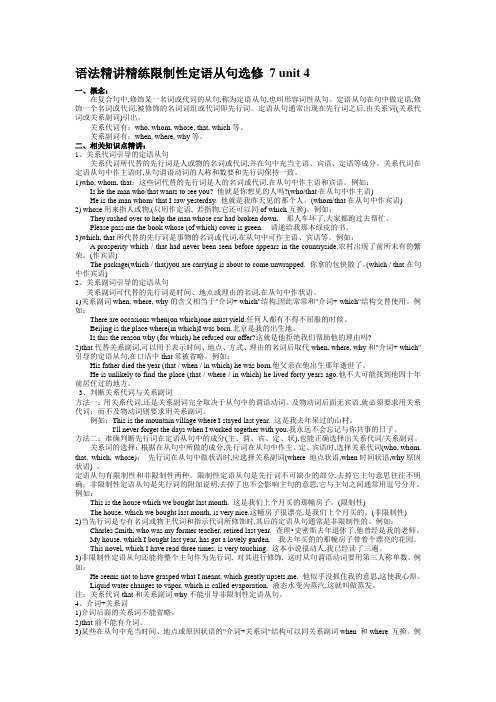
语法精讲精练限制性定语从句选修7 unit 4一、概念:在复合句中,修饰某一名词或代词的从句,称为定语从句,也叫形容词性从句。
定语从句在句中做定语,修饰一个名词或代词,被修饰的名词词组或代词即先行词。
定语从句通常出现在先行词之后,由关系词(关系代词或关系副词)引出。
关系代词有:who, whom, whose, that, which等。
关系副词有:when, where, why等。
二、相关知识点精讲:1、关系代词引导的定语从句关系代词所代替的先行词是人或物的名词或代词,并在句中充当主语、宾语、定语等成分。
关系代词在定语从句中作主语时,从句谓语动词的人称和数要和先行词保持一致。
1)who, whom, that:这些词代替的先行词是人的名词或代词,在从句中作主语和宾语。
例如:Is he the man who/that wants to see you? 他就是你想见的人吗?(who/that在从句中作主语)He is the man whom/ that I saw yesterday. 他就是我昨天见的那个人。
(whom/that在从句中作宾语)2) whose用来指人或物,(只用作定语, 若指物,它还可以同of which互换)。
例如:They rushed over to help the man whose car had broken down.那人车坏了,大家都跑过去帮忙。
Please pass me the book whose (of which) cover is green.请递给我那本绿皮的书。
3)which, that所代替的先行词是事物的名词或代词,在从句中可作主语、宾语等。
例如:A prosperity which / that had never been seen before appears in the countryside.农村出现了前所未有的繁荣。
(作宾语)The package(which / that)you are carrying is about to come unwrapped. 你拿的包快散了。
2019-2020学年人教版英语选修七新素养同步讲义:Unit 4 Sharing 4 Section Ⅳ Grammar Word版含答案

Section ⅣGrammar限制性定语从句1.(教材P29)I know you’re dying to hear all about my life here, so I’ve included some photos which will help you picture the places I talk about.2.(教材P29)The boys who had never come across anything like this before started jumping out of the windows.3.(教材P29)But last weekend another teacher, Jenny, and I did visit a village which is the home of one of the boys, Tombe.4.(教材P29)We walked for two and a half hours to get there—first up a mountain to a ridge from where we had fantastic views and then down a steep path to the valley below.1.定语从句是用来修饰某一名词或代词的从句。
定语从句一般置于被修饰的词之后,且有引导词引导。
被定语从句所修饰的名词或代词叫先行词。
2.引导定语从句的词叫关系词。
关系词分为关系代词和关系副词。
3.定语从句分为限制性定语从句和非限制性定语从句。
关系代词1.关系代词who, whom 和whose关系代词先行词在从句中充当的成分who 人主语、宾语、表语whom 人宾语whose 人/物定语summer vacation. (作主语)我是李华,一名今年暑假在伦敦学习的中国高中生。
◆I’ve become good friends with Li Hua (who/whom/that) I met in the English speech contest last year.我与去年在英语演讲比赛中结识的李华成了好朋友。
- 1、下载文档前请自行甄别文档内容的完整性,平台不提供额外的编辑、内容补充、找答案等附加服务。
- 2、"仅部分预览"的文档,不可在线预览部分如存在完整性等问题,可反馈申请退款(可完整预览的文档不适用该条件!)。
- 3、如文档侵犯您的权益,请联系客服反馈,我们会尽快为您处理(人工客服工作时间:9:00-18:30)。
10.That is the real reason ____ he did it. A. when B. why C. how D. that
Titanic is the ship that was the most beautiful in the world at that time. ______
1. Your teacher of Chinese is a young lady____ comes from Beijing. A. who B. which C. whom D. whose 2. When you read the book, you’d better make a mark ___ you have any questions. A . at which B. at where C. the place where D. where 3. Look out! Don't get too close to the house ____ roof is under repair. A. whose B. which C. of which D. that
物人ຫໍສະໝຸດ 人人;物主语;宾语 作宾语可省 主语;宾语 作宾语可省 宾语 可省
定语 不可省
whose
关系副词的用法
关系副词 指代
where 地点
所做成分 是否可省 略 状语 否 状语
状语
when
时间
原因
否
否
why
Which/that Titanic is the film _________ tells us a moving love story.
Rose the lovers / met on the ship
Jack
Rose and Jack are the lovers who met on the ship . ______
the ship/was the most beautiful in the world at that time
4. The newly built café the walls of , _______ are painted light green, is really a peaceful place for us, specially after hard work. A. that B. it C. what D. which 5. I’ve become good friend with several of the student in my school _______ I meet in the English speech contest last year. A. who B. where C. when D. which
1.
2.Here are two pictures Which/that ________________ are taken from the film . 3.This is the film whose _______ name is Titanic . 4.The man and the womanWhom/who\that _______________ you see in the picture are Jack and Rose . 5.Jack and Rose are the hero and the Who\that heroine ______________ loved each other very much in the film .
An astronaut is a person who works and travels in space.
先行词
关系词,在从中充 当主语
Revision of Restrictive Attributive Clauses 在复合句中修饰名词或代词的从句叫 做定语从句。被修饰的名词或代词叫 先行词。引导定语从句的关系代词有: which, that, who, whom, whose和as。 引导定语从句的关系副词有:where, when, why。
6. Children who are not active or ______ diet is high in fat will gain weight quickly. A. what B. whose C. which D. that 7. Stephen Hawking believes that the earth is unlikely to be the only planets ______ life has developed gradually. A. that B. where C. which D. whose
4.I want to buy a house which faces south.
(subject )
5.How I wish I could have the same car as you have.( object )
6. Do you know the person that is wearing a red hat? ( subject) 7. I can’t read the book that you bought, because it is too difficult.( object ) 8. Yesterday I met Tom, whose father is a doctor.( attributive ) 9. Do you still remember the time when we lived in the countryside?( Adverbial of time )
8. Do you still remember the chicken farm _______ we visited three months ago? A. in which B. where C. which D. who
9. The doctor advised Vera strongly that she should take a holiday, but __________ didn’t help. A. which B. it C. she D. he
10.They visited the house where comrade Zhou Enlai once lived and worked. ( Adverbial of ) place
关系代词的用法
关系代词 指代 that which who whom 所做成分 是否可省略 人;物 主语,宾语 作宾语可省
1. A space capsule is a place where an astronaut works.
先行词
关系副词,在从句 中充当状语
2. A spacecraft is a vehicle which can travel in space.
先行词
关系副词,在从句 中充当主语
1.The man who is now talking to our English teacher comes from America.( subject ) 2.Mary is the girl whom/who I just talked with. ( object ) 3.This is the book which I like very much. ( object )
